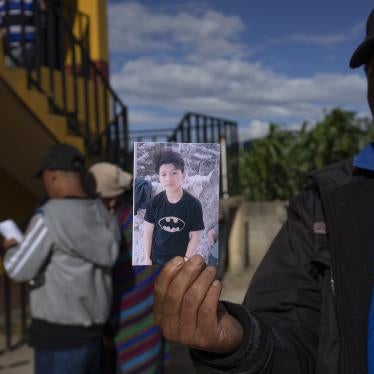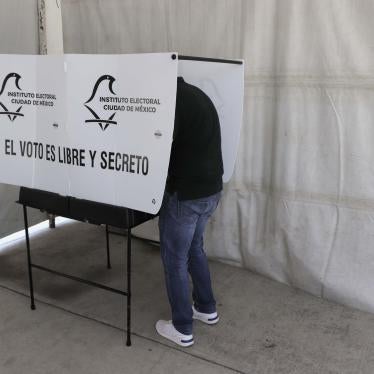Washington D.C., March 2, 2023
Marcelo Ebrard
Secretary of Foreign Relations
Government of Mexico
Mexico City – Mexico
We write on behalf of Human Rights Watch to express our profound concern regarding Mexico’s participation in Chinese government efforts to whitewash its systematic persecution of Uyghurs and other Muslim minorities in the Xinjiang region. These actions exemplify the current administration’s problematic interpretation of the “non-intervention” principle in Mexico’s foreign policy, which has been used to avoid speaking out on serious human rights violations.
As you will be aware, in August 2022, the United Nations Office of the High Commissioner for Human Rights (OHCHR) published a report concluding that the persecution of Uyghurs and other predominantly Muslim minorities in Xinjiang “may constitute international crimes, in particular crimes against humanity.”[1] The report details a litany of abuses, including: the arbitrary detention of an estimated one million people in political re-education camps, pre-trial detention centers, and prisons; religious and cultural persecution; family separations, including the removal of children from their families; enforced disappearances; intimidation, threats and reprisals; and intrusive mass surveillance. Importantly, the report relies heavily on official Chinese government policies, statements, and other documents to draw the conclusion that crimes against humanity may have been committed.
The report noted that the situation “requires urgent attention by the Government, the United Nations intergovernmental bodies and human rights system, as well as the international community more broadly.”[2] Its findings mirrored those of Human Rights Watch and many other organizations that have been documenting in detail these ongoing abuses and calling for action.[3]
Given the grave findings of the report, and its recommendations, we were deeply disappointed that, in October 2022, Mexico did not support a proposal at the UN Human Rights Council to even discuss the report. Mexico’s expressed justification for abstaining was that it preferred dialogue, a dubious explanation given the intention of the vote was precisely to open a dialogue, grounded in a concrete discussion of the OHCHR’s research findings.[4] Partly as a result of Mexico’s abstention, the proposal was narrowly defeated, and the report was not discussed.
We were also deeply concerned by images that circulated on social media last month of Mexico’s UN ambassador in Geneva, Francisca Méndez, on what appeared to be a diplomatic tour of Xinjiang.[5] The Chinese government notoriously uses highly controlled diplomatic tours as a propaganda tool. Previously, journalists have reported that Chinese officials have carefully choreographed these tours, temporarily removing guard towers and fences, permitting only heavily scripted interviews, and forcing detainees to perform pre-prepared songs.[6] Such concerns were, in fact, detailed in the very OHCHR report that Mexico did not consider worthy of discussion at the UN Human Rights Council. The report found that detainees were “explicitly told by guards to be positive about their experience” ahead of a visit by a foreign delegation and that many feared reprisals if they failed to comply. [7]
The apparent participation of Mexico’s ambassador to the UN in Geneva in the whitewashing of what the UN has characterized as possible crimes against humanity is an insult to the victims of serious rights violations in Xinjiang and their loved ones– including those who asked Mexico to support a UN discussion. It has serious implications for Mexico’s international credibility on human rights.
Mexico’s response to Beijing’s efforts to cover up serious abuses in Xinjiang risks sending a troubling message that the Chinese government is beyond international scrutiny for its grave abuses. It also appears to be part of an unfortunate pattern.
Under President Andrés Manuel López Obrador, Mexico has remained silent when governments in the region commit human rights abuses and violate democratic principles. Mexico has also regularly abstained when the UN Human Rights Council and the Organization of American States have voted on resolutions to expose or condemn serious abuses.
Officials have sought to justify these actions as part of Mexico’s “non-interventionist” foreign policy, which is ostensibly intended to respect countries’ sovereignty.[8] This approach ends up favoring governments over the rights of people. Participating in multilateral discussions of human rights issues is not an infringement of sovereignty. These discussions may be uncomfortable, especially for those responsible for committing abuses. But the Human Rights Council was set up precisely to hold facts-based discussions of all member states’ human rights policies. Mexico played an important role in the creation of the Human Rights Council and actively sought its current seat. The Council’s mandate reflects the principle that human rights are universal and that all countries have a responsibility to promote and defend the rights of all people.
As a party to many foundational international human rights agreements, and a current member of the UN Human Rights Council, Mexico has a responsibility to promote and defend human rights at home and abroad and to speak out when other countries fail to comply with their international human rights obligations.
We respectfully urge you to ensure that Mexico applies a foreign policy that is consistent with regard to human rights norms, without double standards. That means, among other actions, publicly supporting international accountability for the Chinese government’s egregious abuses and by supporting a discussion on the human rights situation in Xinjiang at the UN Human Rights Council.
We also respectfully request that you take steps to ensure that Mexico’s participation in Chinese government propaganda efforts in Xinjiang and elsewhere are not repeated. Ambassador Méndez’s trip to Xinjiang should be publicly recognized as a serious mistake by the Mexican government that undermines the country’s standing to promote human rights globally.
We remain at your disposal to discuss this issue and we would appreciate receiving information about any steps that you take in this regard.
Sincerely,
Tamara Taraciuk Broner
Americas Acting Director
Maya Wang
Asia Associate Director
[1] UN Office of the High Commissioner for Human Rights (OHCHR), OHCHR Assessment of human rights concerns in the Xinjiang Uyghur Autonomous Region, People’s Republic of China, August 31, 2022, https://www.ohchr.org/sites/default/files/documents/countries/2022-08-31/22-08-31-final-assesment.pdf (accessed February 24, 2023); “China: New UN Report Alleges Crimes Against Humanity,” Human Rights Watch news release, August 31, 2022, https://www.hrw.org/news/2022/08/31/china-new-un-report-alleges-crimes-against-humanity.
[2] OHCHR, OHCHR Assessment of human rights concerns in the Xinjiang Uyghur Autonomous Region, August 31, 2022, para 149.
[3] Human Rights Watch, “Eradicating Ideological Viruses.” China’s Campaign of Repression Against Xinjiang’s Muslims (New York: Human Rights Watch, 2018), https://www.hrw.org/report/2018/09/09/eradicating-ideological-viruses/chinas-campaign-repression-against-xinjiangs; Human Rights Watch, “Break Their Lineage, Break Their Roots.” China’s Crimes against Humanity Targeting Uyghurs and Other Turkic Muslims (New York: Human Rights Watch, 2021), https://www.hrw.org/report/2021/04/19/break-their-lineage-break-their-roots/chinas-crimes-against-humanity-targeting.
[4] John Fisher and Sophie Richardson, “Global Scrutiny of China Abuses Within Reach,” commentary, Human Rights Watch, October 13, 2022, https://www.hrw.org/news/2022/10/13/global-scrutiny-china-abuses-within-reach.
[5] See, Tweet by Juan Antonio Quintanilla Román, February 10, 2023, https://twitter.com/JAQuintanillaR/status/1623945093337202688 (accessed February 24, 2023).
[6] Erin Handley, “How China's orchestrated tours of Xinjiang echo the 'Potemkin villages' of authoritarian regimes,” ABC News, August 2, 2019, https://www.abc.net.au/news/2019-08-03/the-art-of-the-tour-xinjiang-north-korea-khmer-rouge/11365368 (accessed February 24, 2023); Ben Blanchard, “U.S. official denounces 'choreographed' visits to China's Xinjiang,” Reuters, March 23, 2019, https://www.reuters.com/article/us-china-xinjiang-usa-idUSKCN1R503R.
[7] OHCHR, OHCHR Assessment of human rights concerns in the Xinjiang Uyghur Autonomous Region, August 31, 2022, para 43.
[8] “En política exterior, México actuará con apego a principios de no intervención y respeto a la soberanía: presidente,” AMLO, January 7, 2023, https://lopezobrador.org.mx/2021/01/07/en-politica-exterior-mexico-actuara-con-apego-a-principios-de-no-intervencion-y-respeto-a-la-soberania-presidente/.








